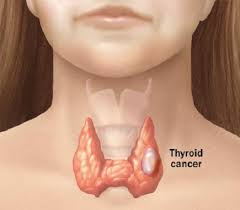- Home
- Editorial
- News
- Practice Guidelines
- Anesthesiology Guidelines
- Cancer Guidelines
- Cardiac Sciences Guidelines
- Critical Care Guidelines
- Dentistry Guidelines
- Dermatology Guidelines
- Diabetes and Endo Guidelines
- Diagnostics Guidelines
- ENT Guidelines
- Featured Practice Guidelines
- Gastroenterology Guidelines
- Geriatrics Guidelines
- Medicine Guidelines
- Nephrology Guidelines
- Neurosciences Guidelines
- Obs and Gynae Guidelines
- Ophthalmology Guidelines
- Orthopaedics Guidelines
- Paediatrics Guidelines
- Psychiatry Guidelines
- Pulmonology Guidelines
- Radiology Guidelines
- Surgery Guidelines
- Urology Guidelines
Thyroid cancer survivors at higher risk of developing CVD

Within five years of cancer diagnosis, male thyroid cancer survivors have a nearly 50 percent higher risk of developing heart disease as compared to women, according to a new study published in the Journal of Clinical Endocrinology & Metabolism.
The study was conducted by Mia Hashibe, Huntsman Cancer Institute in Salt Lake City, Utah, and colleagues to investigate the association between potential risk factors, treatment effects, and cardiovascular disease (CVD) outcomes in thyroid cancer survivors.
Thyroid cancer occurs due to the growth of nodules or cancerous tumors in the thyroid (a butterfly-shaped gland at the front of the neck). It is the fastest growing cancer in the United States, in both men and women, with more than 62,000 new cases diagnosed every year. It is often diagnosed in young people and has a five-year survival rate of 98 percent. It is important for survivors to know about the impact of the cancer treatment on their long-term health.
"Thyroid cancer survivors are at high risk of developing cardiovascular disease (CVD)," said Hashibe. "Our study found that male thyroid cancer survivors have an almost 50 percent higher risk of developing CVD than women, while thyroid cancer survivors with obesity have a 41 percent higher risk."
For the cohort study, researchers studied the medical records of nearly 4,000 thyroid cancer survivors over a 15-year period using the statewide Utah Population Database. The researchers examined potential risk factors, treatment effects, and CVD outcomes in this population. Factors like sex, baseline weight, and thyroid stimulating hormone (TSH) therapy were associated with higher CVD risk within five years of cancer diagnosis.
Key Findings:
- Male thyroid cancer survivors face a nearly 50 percent higher risk of developing CVD than women.
- Survivors of this cancer who have obesity have a 41 percent higher risk of developing CVD as compared to non-obese patients.
- Individuals whose TSH levels were suppressed as part of their cancer treatment have a 25 percent higher risk of developing CVD.
"Our findings suggest that thyroid cancer survivors should be continuously monitored and screened for CVD for both earlier detection and better preventative care," concluded the authors.
For further information click on the link: https://doi.org/10.1210/jc.2017-02629

Disclaimer: This site is primarily intended for healthcare professionals. Any content/information on this website does not replace the advice of medical and/or health professionals and should not be construed as medical/diagnostic advice/endorsement or prescription. Use of this site is subject to our terms of use, privacy policy, advertisement policy. © 2020 Minerva Medical Treatment Pvt Ltd